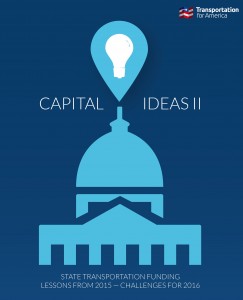 After years of inactivity on the issue, transportation funding has increasingly become a critical issue in states both red and blue and elected state representatives have responded by moving to raise new funding at the state and even local level. With 12 states successfully taking action this year, 2015 had the largest number of successful increases in state transportation funding since Transportation for America began tracking this phenomenon several years ago.
After years of inactivity on the issue, transportation funding has increasingly become a critical issue in states both red and blue and elected state representatives have responded by moving to raise new funding at the state and even local level. With 12 states successfully taking action this year, 2015 had the largest number of successful increases in state transportation funding since Transportation for America began tracking this phenomenon several years ago.
For decades, the federal government was a dependable partner for states, guaranteeing billions of dollars in reimbursements primarily to state governments to fund highway and public transit projects. americans drove more year after year and the resulting gas tax receipts steadily increased. But over the past decade, the total amount of driving plateaued (though it recently began to increase once again), per capita driving rates decreased, and our vehicle fleet became more fuel efficient, reducing by billions the revenue the federal government receives annually from the 18.4 cents-per-gallon gasoline tax. With the federal gas tax unchanged for more than two decades, inflation in construction costs further eroded the value of these already-dwindling funds.
Congress did not increase the gas tax in the recently passed transportation authorization law — the FAST Act — which required a transfer of more than $73 billion in general funds to the highway trust fund (htf) to pay for the nearly flat-funded program over the next five years.1 this came on the heels of extended congressional inaction resulting in 35 short-term policy extensions since 2008 to keep the federal transportation program solvent, causing great uncertainty for states and local governments planning and funding projects.
The same factors decreasing federal revenues have had the same effect on most states’ transportation budgets. like the federal government, nearly all states have relied on static, cents-per-gallon gas taxes to fund their transportation systems. But this revenue gap is even more urgent for states because nearly all are constitutionally or statutorily required to balance their budgets.
The first half of this report summarizes this year’s overall state legislative action on transportation funding packages and policies enacted. In the second half, we examine two specific funding proposals closely on the merits to see how they compare to both T4america’s policy platform and the critical strategies for successful funding campaigns outlined in T4America’s first Capital Ideas report released earlier in 2015, Capital Ideas: Winning State Funding for Transportation, Lessons from Recent Successes.
Were the proposals in Utah and Michigan good ones for those states’ residents? did the coalition of supporters choose a winning strategy? this second half of this report wraps up with a close look at a policy-oriented bill in Virginia to institute a transparent and accountable process to redirect existing transportation funds to the projects that will deliver the greatest return.
Download the full report PDF here



















